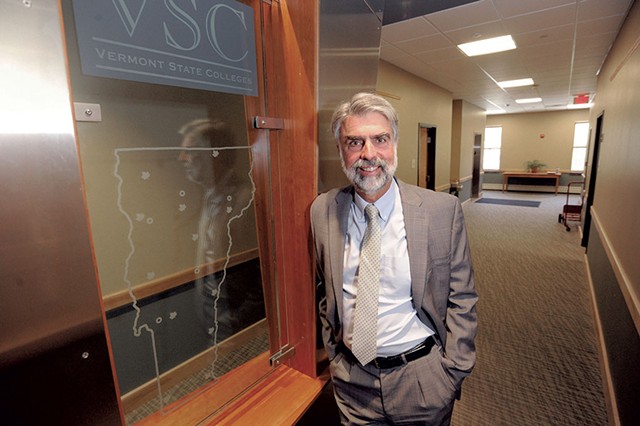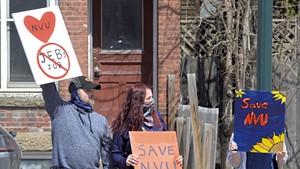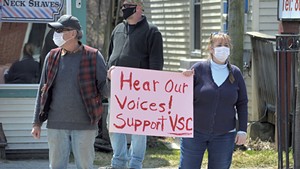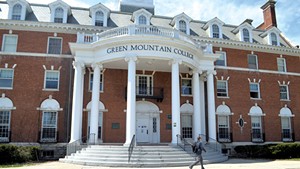
- Jeb Wallace-brodeur
- Jeb Spaulding
Two dozen Lyndon State College students streamed into a community room last Thursday for a lunchtime meeting with top brass.
The topic? A proposal so big it could forever change their academic experience. Vermont State Colleges chancellor Jeb Spaulding is pushing a plan to merge Lyndon and Johnson State College under one president, with a single budget and accreditation.
But when it came time for questions, students had to be prodded to address Spaulding, Johnson president Elaine Collins and Lyndon interim president Nolan Atkins. A few polite inquiries trickled out until finally Connor Cyrus, a reporter-in-training with Lyndon's broadcast television program, threw out a harder-hitting question: If students petitioned against the merger, would the board take them seriously?
"I think they would take it seriously, yeah," Spaulding replied. "But that's not the reaction I've heard."
Indeed, there are no signs of protest from students, faculty or staff at either Johnson or Lyndon. But members of the college community do have a nagging fear that this sea change is coming at the speed of a tsunami.
The Vermont State Colleges Board of Trustees is poised to vote on the unification September 29 — even though a bi-campus advisory panel has barely started assembling questions about how the plan will work.
Spaulding argues that in the face of declining enrollment and stagnant state support, consolidating administrations is the best way to make use of diminishing revenue without cutting programs. He insists a single entity will be stronger, without losing what makes each campus unique.
"A larger-sized institution will increase opportunities and supports for students with a more comprehensive curriculum, shared co-curricular learning opportunities, and more efficient use of support resources," he wrote in a July letter announcing the plan.
"It feels a bit rushed," said Shavonna Bent, a Johnson junior from Randolph who is president of the Student Government Association. "Some students are concerned that if they need certain classes they'll have to commute."
"Why can't we push it back ... to make sure we do it right?" said Julie Theoret, chair of the math department at Johnson and a member of the unification advisory committee who is fielding concerns from colleagues.
"It felt like a done deal before we had any say in it," said Jay Shafer, an associate professor who has taught at Lyndon for 12 years. He chairs the college's nationally recognized Department of Atmospheric Sciences, a training ground for meteorologists.
Spaulding isn't budging. In his second year as head of the state colleges system, he sees no reason to delay the vote, which he expects to pass.
If the board approves the move, Johnson and Lyndon would begin their merger July 1, 2017, with the process completed a year later, Spaulding said.
"What we're talking about is unifying Lyndon State College and Johnson State College into one strong college with two distinct campuses," Spaulding told students at Lyndon. The two northern Vermont campuses are 55 hard miles apart.
Students would have access to professors and activities at both campuses, to be overseen by Collins. But the Johnson Badgers and Lyndon Hornets would still field separate sports teams that would compete against each other. And the colleges would get a new name intended to reflect their new status.
Spaulding has heard the jokes about calling the new combo Lyndon Johnson State College. With all due deference to the 36th president, he said, "We're not doing that."
Spaulding insists the door remains open on many issues. He and other administrators have met numerous times with campus communities, are maintaining a unification web page, and have welcomed opinions and questions offered by email.
Spaulding, who spent 16 years as a Democratic state senator, eight as state treasurer and four as Gov. Peter Shumlin's secretary of administration before becoming chancellor in 2015, said not having answers to all of the staff's questions is a good thing. "When you tell them you don't have all the answers, it makes them feel better," he said.
That's not how it feels to Shafer. Calling Spaulding a "reasonable person" and emphasizing that the plan might work, Shafer said he worries that the volunteer unification committee doesn't have time to vet the details.
"It all sounds good on paper," Shafer said, adding, "People need to think what could go wrong. A lot of the leadership doesn't want to talk about that."
The list of unanswered questions is so long, "You'd need a whole encyclopedia," Theoret said. Among them: Which departments will remain separate? Will there be one registrar or two? Will faculty be forced to travel between campuses? Will students be offered rides to take courses at the other campus?
Spaulding has no qualms about deflecting these queries. Asked how much money the change will save or cost, he said, "We haven't completed that to where we're putting out a number right now."
Spaulding plans to outline more details for the board of trustees before the September 29 vote. Asked last week whether that information would be public before then, Spaulding said he hadn't thought about that, then promised, "Yes, it will be."
Martha O'Connor, chair of the 15-member board of trustees, also had little doubt about what the board is likely to do. "It seems to me and to the board that this is the way to go," she said.
O'Connor said she thinks Spaulding will have many of the answers the board needs. The group will likely spend the afternoon of September 28 discussing concerns about unification and vote the next day, she said.
Spaulding proposes to use the August departure of Lyndon president Joe Bertolino for a job in Connecticut as an opportunity to consolidate the two colleges' administration. The chancellor expects to eliminate one president's position, one dean of administration and one other dean, saving about $500,000 a year in salaries. It is less clear which additional positions might be eliminated.
"A unified college will create significant savings over time," Spaulding said when he announced the plan in July.
He insists the move comes not from desperation, but as a proactive measure to prevent more drastic decisions due to shrinking resources.
"Despite the fact that each of these colleges, Lyndon and Johnson, have already employed operating budget cuts and increased tuition, they each have experienced significant operating deficits in the last fiscal year and are expected to run significant deficits again this year," Spaulding said in July.
"I'm not saying we would close one of the campuses" if the merger is rejected, he said, but, "If we didn't do this, I think it would increase the odds somewhere down the road."
Even those who harbor trepidation about the plan acknowledge its logic. "Doing the same old thing would probably lead us in the wrong direction," said Theoret, "so I can understand the chancellor wanting to do this. I think it could work."
There's no disputing that enrollments are declining as the number of college-age students in the Northeast drops, Spaulding noted. Meanwhile, the cost and expectations facing colleges are rising while Vermont remains 49th among states for tax support of its state colleges.
"We're not going to bet our future on a significant change in state support," said Spaulding, who spent years crafting state budgets and now lobbies lawmakers for more money. "That doesn't mean we're going to give up on it."
Ben Johnson, president of the American Federation of Teachers Vermont union that represents faculty, argued that state leaders put the colleges in this position. "People act as if the state of the Vermont State Colleges and this financial crisis is an act of god," he said. "It's an act of the state legislature."
The union isn't speaking either in support of or against unification, he said, but he worries it could lead down a slippery slope that could cost jobs and academic programs. "My fear is that unless there's an aggressive attempt to solve the funding problem, this is just the first step in an iterative series of consolidation," he said.
Spaulding first recommended unification for Lyndon and Johnson last fall, suggesting that they complement each other, while recommending a more informal collaboration for Vermont Technical College and the Community College of Vermont.
Johnson and Lyndon have much in common: They are the two smallest of Vermont's state colleges. Johnson had 1,514 students last year and Lyndon 1,266. Both have compact campuses on the outskirts of rural villages. Both boast stellar settings ringed by mountain ranges. When classes let out on a given day, there's no surge of humanity hustling across campus, just a calm trickle.
Students say that's exactly what enticed them. "It's in the middle of nowhere," said Johnson freshman Will Jones of St. Albans, as he sat on the quad working on a class assignment. "I don't like going out and seeing concrete."
But the two campuses also have distinct differences. Lyndon, with the slogan "Turn your passion into a profession," is nationally known for professional programs including meteorology and broadcast television. Forty percent of Lyndon students are from out of state, the highest percentage of any of the state colleges.
Johnson purposely offers a broader liberal arts education. Its slogan, "Vermont's premier public liberal arts college," comes from a designation granted this year by the Council of Public Liberal Arts Colleges. Eighty-five percent of its students are from Vermont.
Retaining those distinct identities looms as the biggest challenge and risk in the unification plan. Students said they worry about class size, connection to faculty and even about the president.
Lyndon students called Bertolino "President Joe." "Students knew him," said Cassie Helmar, a senior from Marion, Mass., who is Lyndon's Student Government Association president.
Last week, they took right to addressing Collins as "Elaine" and wanted to know how often she'd be on campus.
Collins told them she'll have offices on both campuses. At Grand Valley State University in Michigan, where she was dean of the College of Education before coming to Johnson in 2015, she had five campuses and drove 40,000 miles a year. "I'm very familiar with that kind of management," she said.
Seemingly small things, such as where the president will be based, reflect larger concerns about how unification will alter campus life. What to name the consolidated institution is another example.
"The name Lyndon is what gets us jobs," said Helmar, who hopes to work as a television videographer after graduation next year. "I think, keep the name so we don't have to rebrand everything."
Shafer, the meteorology chair at Lyndon, argued that the name is too important to leave to whim. "You mess with the brand, you mess with everything else. A little more care needs to be attached to changing the name," he said. "I don't want it being done by people having a beer after a board meeting."
A new name might be among the decisions the board makes September 29, along with the overall unification plan, Spaulding said. After that, he said, the 12-member unification advisory committee will remain in place to sort out how the merger affects specific programs, and the unions will begin bargaining on issues such as travel required between the two campuses.
But one thing seems clear: Unification will happen. And Spaulding is steadfast that the change will make Lyndon and Johnson stronger. "It's going to be an evolution," he said. "There's plenty of time to adjust."
Last week at Lyndon, he suggested that students from both campuses put on a musical performance for the legislature next year, one way to market the marriage to those who hold the purse strings. "A lot of people don't know how special Lyndon and Johnson are," he said.














Comments (5)
Showing 1-5 of 5
Comments are closed.
From 2014-2020, Seven Days allowed readers to comment on all stories posted on our website. While we've appreciated the suggestions and insights, right now Seven Days is prioritizing our core mission — producing high-quality, responsible local journalism — over moderating online debates between readers.
To criticize, correct or praise our reporting, please send us a letter to the editor or send us a tip. We’ll check it out and report the results.
Online comments may return when we have better tech tools for managing them. Thanks for reading.